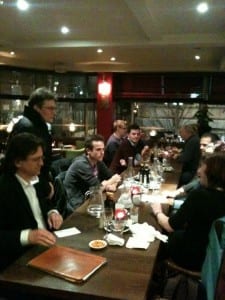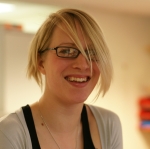I have spent a lifetime being interested in discovering new things; as a reporter, writer and editor; as a university lecturer; and currently, as a part-time doctoral student at UCL’s Department of Information Studies. For many reasons, I cannot claim to be one of the world’s most prolific twitterers. But from a single tweet on Wednesday January 11, it turns out that I helped launch a rapidly growing meme that has provided a fascinating glimpse into the world of early-career research, and sparked off a debate. Here is my story about the birth of #tweetyourthesis.
I am a member of faculty on a writing degree, where much of the teacher’s work consists of encouraging students to give very detailed attention to language, so that every word counts. It also involves showing the creativity made possible by constraint. Assessment can include not only creative work, but also the synopsis, story outline and single-sentence summary. One class exercise led to a competition for a t-shirt slogan about writing. The reflection sparked by such tasks helps the writer define the story and achieve creative distance and, as mentioned in a Day of DH 2011 post, helps to contextualise digital forms in the classroom.
On Wednesday January 11, I came to a dinner organised by Dr Melissa Terras for students connected to the UCL Centre for Digital Humanities (UCLDH). My head was full of that morning’s class. I had asked students to use a storyboard template, to help clarify the structure of their work; to show willing, I also storyboarded my own doctoral thesis.
That evening I showed the result to Professor Claire Warwick, head of the UCL department, who encourages innovation in communicating research work.  In the playful discussion that followed, fellow research student and graphic artist Rudolf Ammann dashed off a drawing (left). I said it looked like a tweet, and perhaps we should go one better than storyboarding. Professor Warwick instantly suggested the #tweetyourthesis hashtag and I promised to kick it off when I got home. Within 24 hours there were contributions from around the world, and an interview request from the US Chronicle of Higher Education.
In the playful discussion that followed, fellow research student and graphic artist Rudolf Ammann dashed off a drawing (left). I said it looked like a tweet, and perhaps we should go one better than storyboarding. Professor Warwick instantly suggested the #tweetyourthesis hashtag and I promised to kick it off when I got home. Within 24 hours there were contributions from around the world, and an interview request from the US Chronicle of Higher Education.
I am still digesting the experience, but can say for certain that it leaves me very appreciative of a rewarding and innovative research culture made possible by a combination of encouragement from above and an active network that – as Dr Ernesto Priego notes – involves both faculty and students.
It also confirms my feeling that the public engagement skills that come with practice-based disciplines are valuable, although probably still undervalued.
Finally, I have been reminded of the fears that social media still evoke, in academe and elsewhere, and the need to continue the dialogue about its impact.
 UCL DIS research student Alexandra Eveleigh has been awarded a one-year graduate research scholarship for cross disciplinary training and will spend a year from October 2012 at the UCL Interaction Centre (UCLIC). The scheme encourages PhD students from any discipline right across UCL to apply to study for an additional year in another UCL department, thus acquiring new research skills and knowledge which can be applied back into their normal area of research. Up to four students are awarded scholarships each year.
UCL DIS research student Alexandra Eveleigh has been awarded a one-year graduate research scholarship for cross disciplinary training and will spend a year from October 2012 at the UCL Interaction Centre (UCLIC). The scheme encourages PhD students from any discipline right across UCL to apply to study for an additional year in another UCL department, thus acquiring new research skills and knowledge which can be applied back into their normal area of research. Up to four students are awarded scholarships each year. Close
Close






